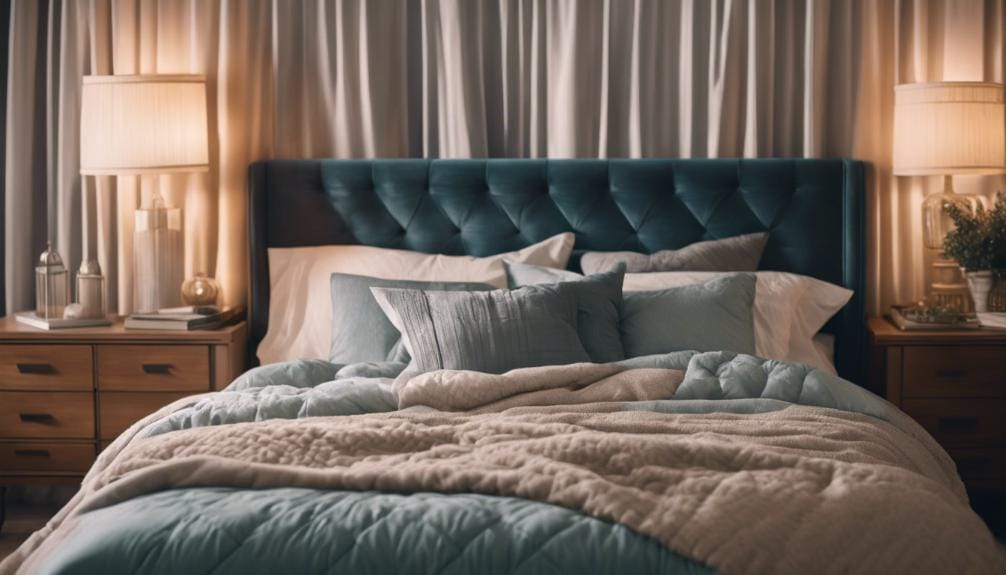What Does Bedding Mean? Unveiling the Definition and Importance
Bedding refers to materials like sheets, pillowcases, and comforters that make up your sleep environment. It originated from the Old English word ‘bedd’ and has evolved for comfort and style. Various materials like cotton, silk, and linen offer unique benefits such as breathability, luxury, and durability. Organic options like bamboo are sustainable and eco-friendly, while synthetics like polyester are hypoallergenic and easy to care for. Grasping bedding‘s evolution—from straw mattresses to modern fabrics—can enhance your sleep quality. Uncover more about the crucial role bedding plays in enhancing your daily rest experience.
Origin of Bedding
The concept of bedding traces its roots back to the Old English word ‘bedd,’ signifying a designated sleeping area or bed.
Over the centuries, bedding has transformed to create a comfortable sleep environment.
From the medieval times of straw or hay mattresses to the Renaissance era‘s elaborate bed curtains, bedding has evolved to meet the diverse needs of individuals seeking both comfort and style, even in bustling cities like New York.
Types of Bedding Materials
When it comes to bedding materials, there’s a wide range to choose from. Common options include:
- Cotton
- Silk
- Linen
- Bamboo
- Microfiber
Each material offers unique benefits, catering to different preferences and needs.
Common Bedding Fabrics
Among the various types of bedding fabrics available, cotton, linen, silk, and polyester stand out as common choices for their distinct qualities and benefits.
- Cotton: breathable, durable, easy to care for.
- Linen: natural texture, moisture-wicking, cooling effect.
- Silk: luxurious, hypoallergenic, temperature-regulating.
- Polyester: affordable, wrinkle-resistant, quick-drying.
Organic Bedding Options
Exploring organic bedding options opens up a world of sustainable and eco-friendly materials for a healthier and more comfortable sleeping experience. Materials like cotton, linen, bamboo, and hemp are grown without harmful chemicals, making them softer, more breathable, and hypoallergenic.
Certified by organizations like GOTS, these options promote sustainability and purity. Opting for organic bedding can enhance your sleep environment and reduce exposure to toxins found in conventional bedding.
Synthetic Bedding Materials
Synthetic bedding materials, such as polyester, microfiber, and nylon, offer a range of benefits for those seeking durability and hypoallergenic options for their bedding choices. These materials are often hypoallergenic, suitable for allergy sufferers.
They’re known for their durability and wrinkle resistance, making them easy to care for and often machine washable. Common synthetic bedding items include comforters, duvet covers, and pillowcases.
Evolution of Bedding Practices
Bedding practices have come a long way throughout history, reflecting the changing needs and preferences of societies. From ancient civilizations using natural materials to the mass production during the Industrial Revolution, the evolution of bedding is a fascinating journey.
Getting historical traditions, modern trends, and cultural influences on bedding can provide valuable insights into how we approach this essential aspect of our lives.
Historical Bedding Traditions
Throughout history, the way people have approached creating a comfortable sleeping space has transformed immensely.
- Early bedding practices involved animal skins and straw mattresses.
- Ancient Egyptians used wooden headrests, linen sheets, and stone or wood pillows.
- Middle Ages saw straw mattresses on wooden frames, often shared.
- Renaissance introduced elaborate bedding with silk and velvet fabrics.
Modern Bedding Trends
Amidst the ever-evolving landscape of interior design and home decor, the domain of bedding has undergone a remarkable transformation towards embracing sustainability and innovation.
Modern bedding trends lean towards eco-friendly materials like organic cotton and bamboo, featuring bold patterns, bright colors, and luxurious textures for a stylish bedroom aesthetic.
Technology integration with temperature-regulating fabrics and smart bedding systems is on the rise, while customization options cater to individual preferences.
Cultural Influences on Bedding
Cultural influences have profoundly shaped the evolution of how people approach their choices in bedding.
- Bedding practices have evolved over time due to cultural influences, reflecting changes in societal norms and preferences.
- Different cultures have unique traditions and styles when it comes to bedding, showcasing a diverse range of materials, patterns, and designs.
- The history of bedding reflects shifts in technology and availability of materials, leading to innovations in comfort and aesthetics.
- Bedding choices can also be influenced by environmental factors, such as climate and geography, impacting the types of materials used.
Significance of Quality Bedding
Investing in high-quality bedding is essential for ensuring a comfortable and restful night’s sleep. Quality bedding can improve overall comfort and regulate body temperature, enhancing the aesthetic appeal of your bedroom. It provides support for better physical and mental well-being, extending the lifespan of mattresses. Check out the table below to see the various benefits of investing in good bedding.
| Benefits of Quality Bedding |
|---|
| 1. Improved comfort and sleep quality |
| 2. Regulates body temperature |
| 3. Enhances bedroom aesthetics |
| 4. Contributes to well-being |
| 5. Extends mattress lifespan |
Impact of Bedding on Sleep

Selecting the appropriate bedding can greatly influence your sleep quality by offering comfort and support throughout the night. Quality bedding can help regulate body temperature, promoting better sleep patterns.
It also reduces allergens and irritants, creating a healthier sleep environment. Investing in high-quality bedding improves sleep hygiene, leading to better relaxation and rejuvenation during rest.
Personal preference is essential in choosing bedding to align with comfort levels and sleep habits.
Importance of Pet Bedding
To guarantee your pet’s comfort and well-being, grasping the significance of essential pet bedding is vital. Proper pet bedding can provide comfort, insulation, and support, helping prevent joint pain and pressure sores.
Quality bedding regulates body temperature, reduces stress, and benefits pets with specific needs like memory foam or orthopedic options.
Choosing the Right Bedding

Consider your personal preferences like fabric type, design, and comfort level when choosing the right bedding for your needs.
Take into account the thread count of sheets for quality and durability.
Select bedding accessories such as pillows and throws to enhance the overall look of your bed.
Opt for hypoallergenic materials if you’re sensitive to allergens, ensuring a comfortable sleep environment.
Maintaining Bedding Hygiene
Maintaining proper bedding hygiene is essential for ensuring your overall health and well-being. Regularly wash your bedding to eliminate dust mites, bacteria, and allergens.
Changing your sheets weekly can prevent skin irritations and respiratory issues. Vacuuming mattresses and pillows helps remove dust and debris, enhancing sleep quality.
Opt for hypoallergenic bedding materials to reduce the risk of allergic reactions and skin sensitivities. Your health starts with clean bedding habits.
Frequently Asked Questions
What Is the Definition of Bedding?
When you ask about the definition of bedding, it refers to coverings like sheets, blankets, and pillowcases used on a bed. Bedding provides comfort, warmth, and style to your sleeping space, catering to your individual preferences and needs.
What Is the Short Meaning of Bedding?
When you ask about the short meaning of bedding, it’s about the coverings and materials for a bed or animal resting place. They offer comfort, warmth, and protection. Your choice of bedding affects sleep quality and bedroom appearance.
What Is the Old Meaning of Bedding?
The old meaning of bedding relates to coverings for beds and materials used for animal resting places. It originally included bed clothing and bed clothes. The concept has expanded to encompass a variety of products for comfort and aesthetics.
What Is the Legal Definition of Bedding?
Grasping the legal definition of bedding is crucial. It encompasses materials for beds and animals. Regulations guarantee safety for products like mattresses. Knowing this can assist you in making informed choices when purchasing bed items.
Conclusion
To sum up, bedding isn’t only about comfort and style, but also plays a vital role in ensuring quality sleep and overall well-being.
From the materials used to the maintenance required, selecting the right bedding is essential for a good night’s rest.
Whether it’s for yourself or your beloved pet, investing in high-quality bedding can make a significant difference in your daily life.
So, remember to prioritize your bedding choices for a healthier and happier lifestyle.
